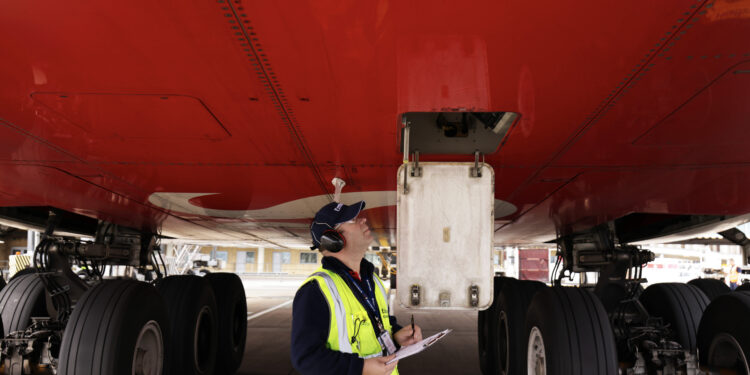At London Heathrow Airport, Emirates has accepted delivery of sustainable aviation fuel (SAF) from Shell Aviation. Up until the end of the summer of 2024, more than 3,000 metric tonnes of clean SAF mixed with conventional jet fuel will be fed into the airport’s fuelling infrastructure network.
This is the largest amount of SAF the airline has purchased to date and the first time it will be used to power some of its flights at London Heathrow. Emirates is part of the SAF Incentive Programme at London Heathrow, which guarantees accessibility and affordability for airlines that use the airport.
With reliable reporting procedures, the airline will be able to track and trace the delivery of SAF at London Heathrow in addition to its sustainability features. Emirates’ acquisition of SAF from Shell Aviation will be securely integrated into the current airport fuelling system and aircraft engines. When compared to utilising conventional jet fuel, SAF can cut lifecycle carbon emissions by as much as 80% when used in neat form (i.e. unblended) and calculated with established life cycle assessment (LCA) methodologies, such as CORSIA methodology.
“Emirates is eager to take this next step in our SAF journey with Shell Aviation and London Heathrow supporting us with this fuel supply arrangement in one of our biggest operations outside of Dubai. The LHR Incentive Programme will support the SAF market’s increasing momentum, allowing airlines like Emirates to take advantage of its availability and make it more commercially viable.
London Heathrow’s SAF initiative also demonstrates credible action to encourage the scale up and use of SAF by airlines, building local production capabilities grounded in real demand, in addition to developing capacities across the supply chain to blend, handle and distribute SAF more widely. We hope that the initiative receives collective support of government authorities to boost more investment in SAF production in the future. While Emirates explores opportunities to increase the use of SAF within our network, we’ll continue to take other steps to reduce our emissions, with a major focus around optimising flight operations including weight reduction of aircraft and charting more efficient flight routes, among other initiatives.”
Adel Al Redha, Deputy President and Chief Operations Officer at Emirates Airline.
“After our successful collaboration with Emirates to supply SAF to Dubai (DXB) last year, we are pleased to continue our support for their sustainability journey by enabling the airline to decarbonise flights out of the UK. This development also marks further progress in the growth of our global SAF supply network. Our goal is to continue to work with forward-thinking players in the aviation industry, like Emirates and London Heathrow, to make SAF available in more locations around the world.”
Raman Ojha, President of Shell Aviation.
“We are thrilled to support Emirates with Heathrow’s Sustainable Aviation Fuel (SAF) scheme. SAF is crucial to decarbonising long haul flights as it can cut the carbon on routes like London to Dubai without the need for new aircraft or infrastructure. Thanks to commitments from airlines like Emirates, we expect to support the use of up to 155,000 tonnes of SAF at Heathrow this year. Now we need to ramp up SAF production in the UK so the country can benefit from jobs, growth and energy security as more airlines make the switch to more sustainable fuels.”
Ross Baker, Chief Commercial Officer at Heathrow Airport.
The first-of-its-kind London Heathrow SAF Incentive scheme was introduced in 2022 and offers a support mechanism to reduce the premium price difference of approximately 50% between SAF and conventional jet fuel. Programmes like the one at London Heathrow are designed to expedite beneficial government initiatives, boosting the competitiveness of the UK by opening up investment in clean energy projects like the production of SAF.
The focus of Emirates’ SAF strategy are to identify methods to use SAF operationally wherever it is available in the airline’s network, share emissions costs with freight forwarders or corporate customers when practical, collaborate with reliable partners on longer-term SAF projects and support SAF ventures in the UAE that have the potential to supply Sustainable Aviation Fuel at its hub.
Emirates currently uses SAF to operate flights from Amsterdam, Paris, Lyon, and Oslo. The airline and Shell Aviation worked together last year to deliver SAF into the fuelling systems at Dubai Airport for the first time ever, assigning the SAF to several aircraft. The airline intends to collaborate with regional partners at Singapore Changi Airport in May of this year in order to supply SAF through the airport’s fuelling systems.
Emirates was the first international airline to sign up for the UK’s Solent Cluster earlier this year. The cluster is centred on low-carbon investments and has the potential to build a Sustainable Aviation Fuel (SAF) plant capable of producing up to 200,000 tonnes (200 kt) annually if it is operational by 2032. The Solent Cluster is an international partnership spanning many sectors, comprising of top logistics and infrastructure operators, manufacturing and engineering firms, regional enterprises, and academic institutions.
Since 1987, Emirates has operated 131 weekly flights to seven gateways in the United Kingdom. These include six daily A380 flights to London Heathrow (plus an additional five weekly flights using the Boeing 777 aircraft until October 26, 2024); three daily A380 flights to Gatwick; two daily flights to Stansted; three daily A380 flights to Manchester; two daily flights to Birmingham (including a daily A380 service); daily flights to Newcastle; and one daily A380 flight to Glasgow.
If you are interested in meeting with Airlines moving to use sustainable fuels, contact us today to learn about our MTB Aviation events.

































